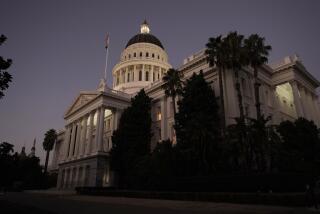Governor Signs Assault Weapon Legislation
SACRAMENTO — Gov. George Deukmejian on Wednesday signed legislation banning military-style assault weapons and appealed for passage of other bills designed to crack down on illegal use of guns, keep them out of the hands of criminals and impose a waiting period for purchase of all firearms.
Even without the governor’s plea, restrictive gun measures are advancing in the Legislature as never before. Proposals include limiting ammunition magazines to 10 rounds each and allowing police to stop motorists in search of contraband weapons.
“There’s no question that the signing of this legislation cracks the ice for further anti-gun legislation,” said Sen. Ed Davis (R-Valencia), an opponent of the assault gun ban and a former chief of police of Los Angeles.
“Maybe we can interject some reason and work to stop the other bills,” said Brian Judy, lobbyist for the National Rifle Assn., which took a severe beating on the assault gun bill.
At a ceremony where he was flanked by key legislators and law enforcement officials, Deukmejian said peace officers facing heavy firepower from the assault weapons of drug traffickers and street gangs “need all the help that we can give them as they seek to preserve our public safety.”
Conspicuous by his absence was Atty. Gen. John K. Van de Kamp, a primary sponsor of the bill and a Democratic contender for governor next year. Deukmejian said Van de Kamp asked for an invitation and was refused because he is a gubernatorial candidate. At least six uninvited legislators crashed the ceremony anyway.
The legislation, sponsored by top-level law enforcement officials and carried by Assemblyman Mike Roos and Senate leader David A. Roberti, both Los Angeles Democrats, makes California the first state to outlaw a vast arsenal of semiautomatic assault weapons. The statute will take effect Jan. 1.
Citing the Jan. 17 slayings of “five beautiful young children” in a Stockton elementary school play yard by a mentally disordered petty criminal armed with an AK-47 assault rifle, Deukmejian expressed hope that the Roberti-Roos legislation and the other bills he wants will help “save innocent lives.”
Registration System
The new statute, among other things, will make it illegal to import, manufacture, distribute, sell, lend or give away about 60 types of military-style semiautomatic rifles, shotguns and pistols. The bill also establishes a registration system until 1991 for current owners of such weapons and empowers the courts to ban copies of the prohibited weapons.
Supporters maintain that the proposal was carefully drafted to exclude hunting and other recreational firearms, an assertion disputed by the NRA and other gun owner organizations.
Deukmejian’s support for outlawing civilian versions of semiautomatic firearms that are patterned after military combat weapons helped pave the way for the legislation over the intense opposition of the gun lobby. He used the signing ceremony as a forum to call for enactment of pending gun-related bills sponsored by Republicans, most of whom opposed the Roberti-Roos proposal.
In his appeal, Deukmejian called for expeditious approval of GOP-sponsored bills to stiffen penalties for use of any semiautomatic firearm in the commission of a felony, provide tougher sentences for use of a firearm in sex- and drug-related crimes and make it against the law to sell any gun to someone convicted of a violent misdemeanor or who has been found mentally unstable and a danger.
Under questioning, Deukmejian repeated his support for a Democratic-sponsored bill that would extend to all rifles and shotguns the 15-day waiting period now required for the purchase of a handgun from a dealer. The delay enables the state Department of Justice to make an investigation into the background of the prospective purchaser.
Awash in Gun Legislation
Although the reelection-conscious Legislature historically has been loath to enact new controls on guns or gun ownership for fear of a voter backlash, the Stockton elementary school killings and a pronounced revulsion against urban street gang terrorism has the Capitol awash in restrictive gun legislation.
Virtually everyone agrees that the Roberti-Roos plan threw open the floodgates and made it easier for proponents of gun controls to win passage of their measures.
Assemblyman Tom McClintock (R-Thousand Oaks), chief GOP defender of gun ownership, agreed that “in the short term, the (assault gun ban) opened the floodgates” but forecast that “the moment enforcement of this law begins, you are going to see public opinion drastically shift.”
Reams of gun-related bills are advancing in the Legislature, ranging from a proposal to eliminate long bullet magazines to prohibiting probation for a person convicted of using a sawed-off shotgun or rifle or silencer.
Others potentially, at least, appear to be more far reaching.
For instance, Davis is carrying an “anti-gang” bill that would allow law enforcement officers to stop and search vehicles at night for contraband weapons, provided that a city council or county board of supervisors had declared a local emergency due to the illegal use of guns.
Civil libertarians assert that the bill would violate constitutional prohibitions against unreasonsable searches and seizures. But Davis counters that such stops by police would be similar to those at drunk-driver checkpoints.
15-Day Waiting Period
Another major bill, widely regarded as at least as important as the Roberti-Roos legislation, would establish the 15-day waiting period for all guns and seek to assure that guns are not sold to persons adjudged to be mentally unstable and to persons who had been held for involuntarily psychiatric examinations.
Additionally, the bill by Assemblyman Lloyd G. Connelly (D-Sacramento) would make it against the law for a felon to possess any firearm. Currently, it is against the law for a felon to possess a handgun but not a shotgun or rifle.
Also advancing is a measure by McClintock whose bill contains many provisions similar to the Connelly proposal and would impose sharply increased penalties for illegal use of guns.
In addition, plea bargaining would be abolished for persons accused of firearms offenses, and persons found guilty of violent misdemeanors would be proscribed from purchasing or possessing a gun, as would drug abusers and the mentally unstable.
Deukmejian called for enactment of the McClintock bill, but McClintock said he does not hold high hopes for its approval “without aggressive leadership of the governor. I don’t see aggressive leadership. Frankly, he has done nothing but give it a little lip service now and then.”
At the press conference, Roos, flanked by Sheriff Sherman Block of Los Angeles County and Police Chief Darryl F. Gates of Los Angeles, said the assault gun ban established California as a “watershed from which all else good will (flow) when it comes to bringing a sanity to the responsibility of owning a firearm.”
Van de Kamp, described by an assistant as angered that Deukmejian barred him from the ceremony, issued a statement accusing the GOP governor of “extreme partisanship” but noted the proposal “is now law and California citizens will be safer for it.”
More to Read
Get the L.A. Times Politics newsletter
Deeply reported insights into legislation, politics and policy from Sacramento, Washington and beyond. In your inbox three times per week.
You may occasionally receive promotional content from the Los Angeles Times.










